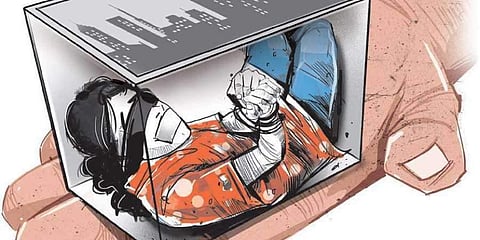

As many as 2,764 childcare institutions across the country, accounting for nearly 40 per cent of such homes, do not have adequate measures to prevent any form of physical, emotional abuse of children that results in trauma, according to government's social audit report.
The social audit of all childcare homes across the country was ordered in 2018 when cases of sexual exploitation of girls were reported from childcare institutions in Deoria in Uttar Pradesh and Muzaffarpur in Bihar.
The social audit was carried out in 7,163 childcare institutions, which house 2.56 lakh children across the country. It found that 2,764 institutions, accounting for 39 per cent of these homes, do not have adequate measures to prevent any form of physical, emotional abuse of children that results in mental or physical trauma.
Among states, 93.8 per cent in Andaman and Nicobar, 86.8 per cent in Tripura and 74.2 per cent of the childcare institutions in Karnataka do not have adequate measures to prevent any form of abuse of children, the report said.
An official with the National Commission for Protection of Child Rights (NCPCR) said a lack of these measures can act as a trigger for physical and emotional abuse of children at childcare homes. The report also found that 1,504 of the homes lack exclusive toilet facilities, while 434 do not have privacy in toilets and bathing areas.
The report also found that 373 such homes lack provision for individual, clean, seasonal and age appropriate clothes, articles and toiletries, and 1,069 homes do not have individual beds for these children. According to the report, 2,039 CCIs constituting 28. 5 per cent of the such homes are still not registered.
Among the states, about 88 per cent of the child care institutions in Maharashtra have not been registered, followed by 51 per cent in Himachal Pradesh and 46 per cent in Delhi, the report showed.
The report also found that managing committees that take decisions on functioning of the childcare homes were constituted in 90 per cent of the homes but regular meetings were not held in 85 per cent of them.
"If these meetings are not conducted then it means that no one has accountability of the home. About 23 per cent of the homes did not have a cook so who prepares the food? About 48 per cent of the homes did not have counsellors," an NCPCR official told PTI.
He said 29 per cent of the childcare homes have staff who do not have training on the rehabilitation process of children. About 70 per cent of the homes have not given training to its staff in child rights protection, while 61 per cent did not impart training on caregiving of these children.
The official said once the social audit reports were ready, they were examined by the commission and various shortcomings/discrepancies were found in all the 7,164 CCIs that were audited.
"Considering the seriousness of the issue and in the best interest of the children to ensure their safety and security, the commission took cognizance and the shortcomings and discrepancies highlighted in the CCI report were communicated to district magistrates/district collectors for immediate actions. These shortcomings were also brought to the notice of the Principal Secretary, Department of Women and Child Development of States," he said.
He said a serious case was observed at a childcare home in Allahabad in Uttar Pradesh which was established to mitigate the hardships caused to the children post-partition activities.
"We found certain violations in the upkeep of the said CCI. As the commission was itself surprised over such a large number of infirmities, it decided to have first-hand information about the home before submitting its report to the court and therefore, visited the home and found the facts mentioned in the report to be true," he said.
"The physical condition of the home was so pathetic that it was difficult to believe. Bathrooms of the CCI (meant for girls) did not have doors and general upkeep of the CCI was far from satisfactory. Children were living there without CWC order. The district magistrate concerned was asked to explain the pathetic state of affairs of the children home," he added.
